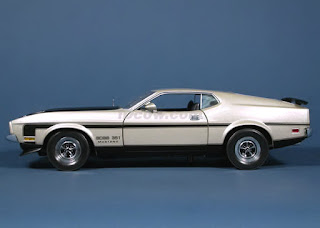Fastest Ford Mustangs Part 1 : 1971 Ford Mustang Boss 351
To run or not run? Ford has finally decided. Not to. With
all the pressure from environmentalists and advocates for the safety of cars,
Ford was impossible to justify dropping four or five million dollars to ski
every year where people could see it. So no more races. Such Boss 351 sheets
hanging from the end of the tip has been cut. The main purpose of its existence
has been to meet the production requirement for brokers SCCA factory would have
something of which to build a giant Trans-Am. But if the factory is not going
to compete with them, who will? Independent Mustangs have not even been able to
keep up with much less independent Camaros competitors factory. This means that
the new Chief 351 is out of the competition before it starts and if you are going
to do in this world, you will have to do as a street car. The unfortunate part
is that, like a street car is less exciting and more than a difficulty that his
Firebird Trans-Am and Camaro Z / 28 competitors. But that's a long story. Let's
start at the beginning.
While almost all the mechanical aspects of Boss is efficient
and competent, the car has suffered greatly at the hands of stylists. Do not
misunderstand. We are not condemning Founder based on their external
appearance. In fact, that side of it is generally attractive, appealing rather
beautiful but it is more than its share of heads and that is what the model
changes is Detroit. It is from within, from the driver's seat, you discover how
the boss has been sabotaged by stylists. It's like being in a bunker; You can
hardly see out. The windows are weapon slots, the beltline reaches almost to
the chin and nearly horizontal rear deck and wide roof pillars block all but a
low field of vision directly to the rear. You have a poor view of the road
ahead of you too. The long, front fenders and bulging hood level, block out a
huge area immediately in front of the car and right turns, especially those on
a stretch of road that falls they are virtually blind.
Moreover, his own vision of the Mustang from the driver's
seat creates the illusion of a huge machine, something about the size of a
float in the Rose Parade. Apparently, it has the immediate environment blocked
from view tells the driver that the car a good amount of space you can not see
is filled. This is unfortunate. While the Mustang is bigger than it has any
business being, certainly not the Forrestal appears to be from the driver's
seat. Actually, it is the same size as the Camaro-1.5 longer and slightly
narrower inches.
In the final analysis, at least half of our disenchantment
with the Mustang is based on poor visibility and an optical illusion of size.
These are key elements in a car whose unique selling point is driving fun.
Logically, the head 351 should it be an American equivalent to the high performance
GT cars in Europe as the Porsche 911, BMW 2800 CS and even the expensive
Italian brands, but lacks the feeling of lightness and agility as it does, is
neither away.
Founder stylists have served a crushing another-area hit the
dashboard. It is a triumph of symmetry over function. The speedometer,
tachometer and fuel gauge are well placed, located in front of the driver, but
the other small sizes are so low in the center of the panel to be well out of
the driver's line of sight. Worse are the heater controls. They, too, are in
the center of the panel, but very low, just above the tunnel. They are so far
from the line of sight of the driver who is almost dangerous to try to read the
letters in the control panel while driving. To make any adjustments in the heat
or defrost system, there are so lean forward from the normal driving position,
a movement that is totally unnecessary. Mustang instrument panel is less than
that of its main competitors and typifies the lack of clear thinking on the
whole package stylist created.









Comments
Post a Comment